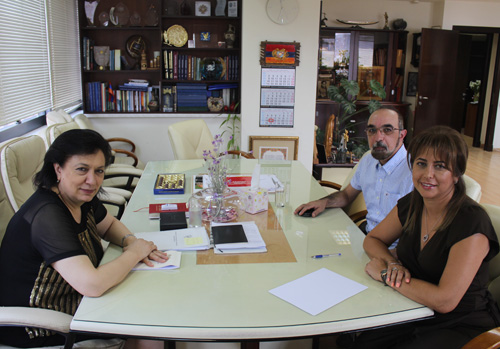“My biggest desire is to seemyHomeland powerfuland in peace; the stronger the Homeland is, the stronger Diaspora will be, and vice versa”. RubinaGhazaryan

The interview with RubinaGhazaryan,the Head of the Armenian community in Austria,is presented below.
– Mrs. Rubina, tell us about your community; how old is its history?
– Last year, in 2013, our community turned 100. This year we are going to celebrate this anniversary with magnificence. It is the community of the Armenian Apostolic Church. It is an old community, perhaps one of the oldest ones in Europe.
We have developed a very close cooperation with the Ministry of Diaspora; we are jointly implementing programs dedicated to the 100th anniversary of the Armenian Genocide. We were very much inspired, when the RA President SerzhSargsyan visited Austria with the Minister of Diaspora HranushHakobyan and had a meeting with the community. It seemed to wake up the Armenianness among the people. The President’s visit gave us a feeling of being protected. We felt that we have a leader;we have Homeland, which always supports us. Especially the children were very much enthusiastic about this.
-Do children speak Armenian?
– It should be stated that we always organize games and meetings in various cities of Europe during the Easter days. Notably, our children mainly speak Armenian unlike the children living in other communities. We have Saturday school and our church,around which the community is consolidated. Both the church and the school are located in the center of Vienna, and we all are much consolidated. A large number of children attend the school and the majority go to the church on Sunday.
-Are children going to school with pleasure?
-In the beginning, they experience some difficulties; they compare themselves with the Austrian children and say, why is that they are free on the weekend, and we have to go to school. But later on, they come with pleasure, meet Armenians, make friends with them, begin writing and reading in Armenian, perceive that impact and begin tocome to school with pleasure. Parents should understand the importance of learning Armenian and preservation of the language.
The official data suggest that 4-5 thousand Armenians live in Austria; the community is very well organized; there are Persian Armenians, Armenians from Istanbul, as well as Austrian Armenians of the second generation.
We try to involve the newcomers; gather information; enlarge the network. Our activity is an ongoing one.
Austria is one of those countries, where the Committee for the 100thAnniversary of the Genocide has been organized long ago; for already 2 years we have been cooperating with embassies; we are very active; we convene meetingson a bimonthly basis. All the unions, the school and the church have their representatives in the Committee; we also have a lawyer. We have a very good program, comprised of 25 items, and do everything to be able to implement all of the items.
-As the head of the community, how would you characterize the Armenian community in Austria? What is its difference as compared to other Diaspora communities?
– I think that one of the characteristic features is that it is well balanced; we have Armenians from almost all locations equally. One characteristic feature is that the community is consolidated around the church and the school. We are in the center of Europe and it is also a distinguishing feature.
-What problems and difficulties do you experience?
– One difficulty is connected with the preservation of the Armenian identity. Our compatriots from Armenia that have come over the last years do not perceive the importance of the community in the first stages in terms of living and existing in Diaspora. They are not familiar with the community life. They do not know how to preserve their Armenian identity in Diaspora, why they should go to church, or take their children to the Armenian school. It is because they hadn’t had this problem in the Homeland. And they understand that they are assimilating, when it is too late. A huge work should be done; the church and the school should attract the children. We work in that direction.
-What expectations do you have from the 5th Armenia-Diaspora Conference? What recommendations do you have?
– It is always interesting to know how the other countries are working, what are they doing, in what sphere they have successes. It is very important to make use the ideas that other communities have successfully implemented. It is very hard to convince the government in Austria. Last year, on April 24, we invited journalists, but didn’t have much success. This year we sent to all the members of the parliament and the President and the Prime Minister the CD of “Disaster” movie with a very interesting accompanying letter, and the feedback was significant.
I want our youth could be involved in state authorities to make our voice audible.
My biggest desire is to see my Homeland powerful and in peace; and the stronger the Homeland is, the stronger Diaspora will be, and vice versa.
Another big desire that I have is recognition of the genocide. Perhaps we won’t be able to achieve it by the 100th anniversary of the Genocide, but at least we couldmake one step forward with regard to theArmenian claim.
Interviewed by KarineBabajanyan




 Արևելահայերեն
Արևելահայերեն Արևմտահայերեն
Արևմտահայերեն Русский
Русский






